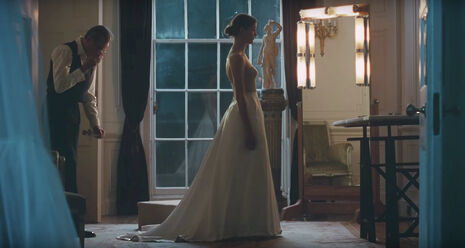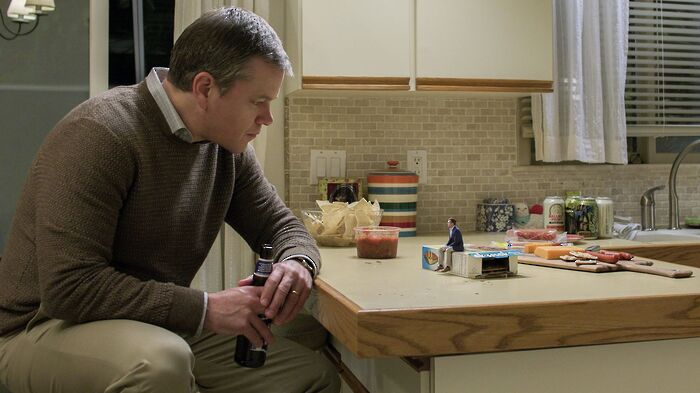Phantom Thread review: ‘sink into the fabric’
Lillian Crawford is haunted and enthralled by Paul Thomas Anderson’s latest cinematic treat

Doors opening. A man breathing heavily. Women munching on a carrot. Slight kicks in the back of the chair. Humming – or is that buzzing? – from the speakers. Whispers, murmurs, statements, gasps, bites, snaps, flicks, thuds – STOP! The dissonance of the backdrop crescendos and the viewer is enraged. Paul Thomas Anderson has crafted a delicate air of perfect silence in which one can hear a pin drop out of place. Whilst watching Phantom Thread, the irritants of the cinema normally so easily cast aside become excruciating. Would that the world were filled with Woodcocks!
"A blanket at moments comforting, at others unbearably sinister"
That cry is not for a proliferation of wading birds, but rather for more people to replicate the deftness of Reynolds, our stable artist on an unbalanced plane. He is a man who deserves the greatest sympathy, frustrated by unscheduled interruption and incessant conversation while he is weaving masterpieces in his mind. The intricacy of Anderson’s films, none more so than this one, suggest that this is a deeply personal protagonist with whom he identifies profoundly. There could have been no finer casting choice than Daniel Day-Lewis, possibly the only actor in the business as devoted to his craft as the director. If he has indeed retired, it will be as sore a blow as a tear in a Woodcock dress.
Seldom is great attention deserved of costume design, but Mark Bridges’s clothing is so mouth-wateringly exquisite that the film could stand alone as a display of fashion. Anderson’s camera rarely leaves the canvas, following needle and thread from sketches to finished works, the dress-making process one that fascinates and enthrals. The swells of Jonny Greenwood’s exquisite score remain firmly attached to the images for much of the running time, merging to create a blanket at moments comforting, at others unbearably sinister.
Reynolds reveals his secrets to us, a lock of his mother’s hair sewn above his breast, small notes embedded in the lining. It calls our attention to every corner of the screen, the viewer’s eyes scouring the scenery for clues to the filmmaker’s own personality. Framed photographs, small trinkets, lines of dialogue – one can scarcely imagine their meaning. In doing so, we are invited to form our own connections, a film with such an exceptionally ambiguous climax demanding subjective interpretation. As with Inherent Vice, it is better to sink into the fabric and revel in its charm.
The foil to this is Alma, a stirringly emotive Vicky Krieps who stumbles into sublimity, her flaws tarnishing the surface. She embodies everything Reynolds loathes, yet his inexplicable love for her drives him to the verge of madness. Sometimes the artist must make concessions, and what may at first appear a curse by the end will morph into a blessing. Through Anderson’s screenplay, the transformation of the central triangle, magnificently completed by Lesley Manville as Reynolds’s sister, Cyril, sets a new bar for cinematic character development.
By the conclusion of Phantom Thread, the head spins with menace. Its intimacy heightens one’s awareness of other people to bursting point, inspiring a similar wrath to Reynolds’s tantrums. Anderson begins proceedings on a mild heat, the core ingredients allowed to simmer, occasionally boiling over but never to the extremes of There Will Be Blood. In doing so, we are left with a jarring aftertaste of incompleteness, the hem not quite finished. By piercing deeper into our thoughts than ever before, this might just be Anderson’s finest film to date
 News / Cambridge academics sign open letter criticising research funding changes22 February 2026
News / Cambridge academics sign open letter criticising research funding changes22 February 2026 News / Supporters protest potential vet school closure22 February 2026
News / Supporters protest potential vet school closure22 February 2026 News / University Council rescinds University Centre membership20 February 2026
News / University Council rescinds University Centre membership20 February 2026 News / Hundreds of Cambridge academics demand vote on fate of vet course20 February 2026
News / Hundreds of Cambridge academics demand vote on fate of vet course20 February 2026 Comment / A tongue-in-cheek petition for gowned exams at Cambridge 21 February 2026
Comment / A tongue-in-cheek petition for gowned exams at Cambridge 21 February 2026









